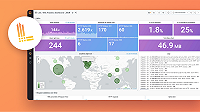Caution
Grafana Agent has reached End-of-Life (EOL) on November 1, 2025. Agent is no longer receiving vendor support and will no longer receive security or bug fixes. Current users of Agent Static mode, Agent Flow mode, and Agent Operator should proceed with migrating to Grafana Alloy. If you have already migrated to Alloy, no further action is required. Read more about why we recommend migrating to Grafana Alloy.
Important: This documentation is about an older version. It's relevant only to the release noted, many of the features and functions have been updated or replaced. Please view the current version.
loki.source.kubernetes
loki.source.kubernetes tails logs from Kubernetes containers using the
Kubernetes API. It has the following benefits over loki.source.file:
- It works without a privileged container.
- It works without a root user.
- It works without needing access to the filesystem of the Kubernetes node.
- It doesn’t require a DaemonSet to collect logs, so one agent could collect logs for the whole cluster.
NOTE: Because
loki.source.kubernetesuses the Kubernetes API to tail logs, it uses more network traffic and CPU consumption of Kubelets thanloki.source.file.
Multiple loki.source.kubernetes components can be specified by giving them
different labels.
Usage
loki.source.kubernetes "LABEL" {
targets = TARGET_LIST
forward_to = RECEIVER_LIST
}Arguments
The component starts a new reader for each of the given targets and fans out
log entries to the list of receivers passed in forward_to.
loki.source.kubernetes supports the following arguments:
Each target in targets must have the following labels:
__meta_kubernetes_namespaceor__pod_namespace__to specify the namespace of the pod to tail.__meta_kubernetes_pod_nameor__pod_name__to specify the name of the pod to tail.__meta_kubernetes_pod_container_nameor__pod_container_name__to specify the container within the pod to tail.__meta_kubernetes_pod_uidor__pod_uid__to specify the UID of the pod to tail.
By default, all of these labels are present when the output
discovery.kubernetes is used.
A log tailer is started for each unique target in targets. Log tailers will
reconnect with exponential backoff to Kubernetes if the log stream returns
before the container has permanently terminated.
Blocks
The following blocks are supported inside the definition of
loki.source.kubernetes:
The > symbol indicates deeper levels of nesting. For example, client > http_client_config refers to an http_client_config block defined
inside a client block.
client block
The client block configures the Kubernetes client used to tail logs from
containers. If the client block isn’t provided, the default in-cluster
configuration with the service account of the running Grafana Agent pod is
used.
The following arguments are supported:
http_client_config block
The http_client_config block configures settings used to connect to the
Kubernetes API server.
bearer_token, bearer_token_file, basic_auth, authorization, and
oauth2 are mutually exclusive and only one can be provided inside of a
http_client_config block.
Exported fields
loki.source.kubernetes does not export any fields.
Component health
loki.source.kubernetes is only reported as unhealthy if given an invalid
configuration.
Debug information
loki.source.kubernetes exposes some target-level debug information per
target:
- The labels associated with the target.
- The full set of labels which were found during service discovery.
- The most recent time a log line was read and forwarded to the next components in the pipeline.
- The most recent error from tailing, if any.
Debug metrics
loki.source.kubernetes does not expose any component-specific debug metrics.
Example
This example collects logs from all Kubernetes pods and forwards them to a
loki.write component so they are can be written to Loki.
discovery.kubernetes "pods" {
role = "pod"
}
loki.source.kubernetes "pods" {
targets = discovery.kubernetes.pods.targets
forward_to = [loki.write.local.receiver]
}
loki.write "local" {
endpoint {
url = env("LOKI_URL")
}
}


